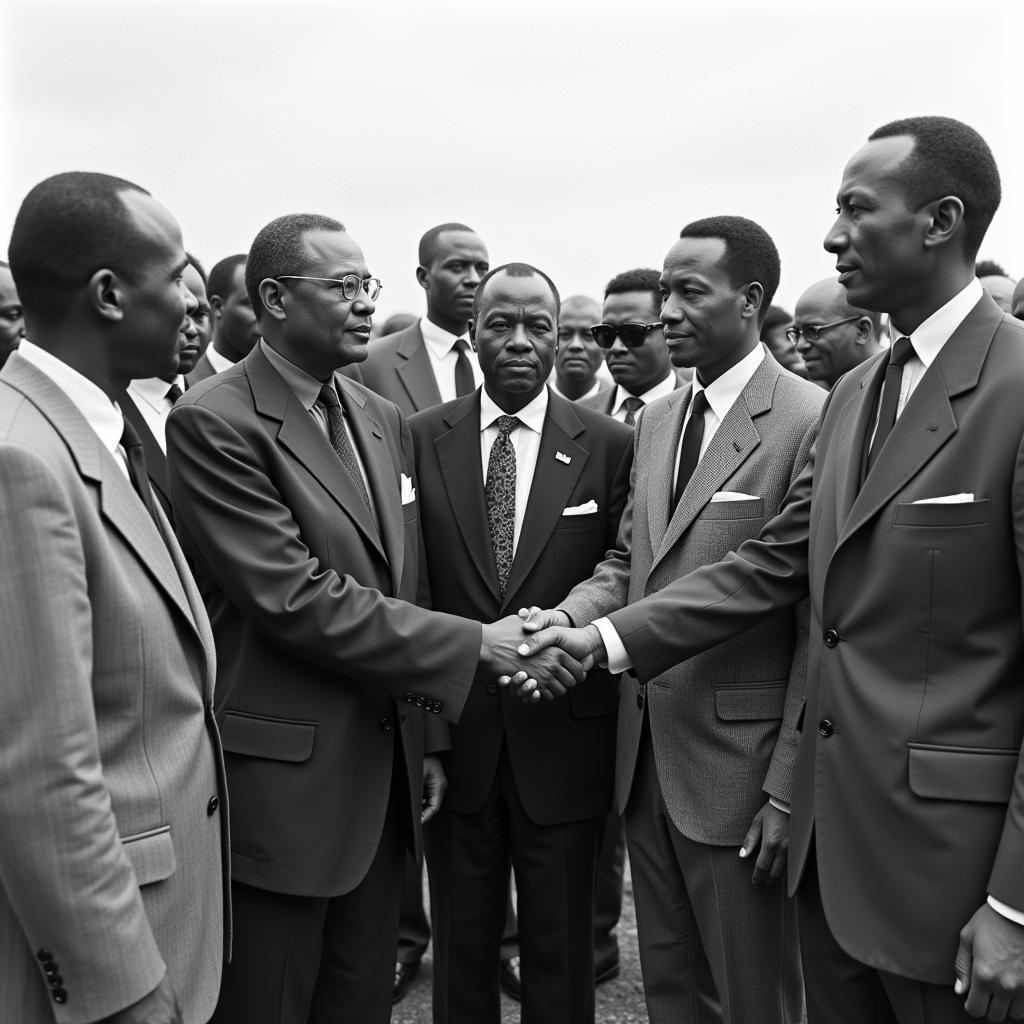Exploring the African Union Members: A Continent United
The African Union, comprised of African Union Members, stands as a testament to the continent’s aspiration for unity and progress. This robust organization encompasses 55 member states, representing a diverse tapestry of cultures, languages, and histories.
A Legacy of Pan-Africanism: The Genesis of the African Union
The African Union, established in 2002, traces its roots back to the Pan-African movement. This movement, emerging in the early 20th century, advocated for the solidarity and liberation of African nations from colonial rule. Key figures like Kwame Nkrumah of Ghana and Haile Selassie of Ethiopia championed the formation of a unified African body. Their vision materialized with the creation of the Organization of African Unity (OAU) in 1963, the precursor to the African Union.
 Founders of the African Union
Founders of the African Union
The Pillars of Unity: Objectives of the African Union
The African Union operates on a foundation of shared objectives, aiming to foster cooperation and development across the continent. Some of its core goals include:
- Achieving greater unity and solidarity: The AU strives to cultivate a sense of shared identity and purpose among African nations.
- Promoting peace and security: The organization plays an active role in conflict resolution and peacekeeping efforts across the continent.
- Accelerating political and socio-economic integration: The AU works towards establishing a free trade area and facilitating economic cooperation among member states.
- Promoting democratic principles and good governance: The AU advocates for democratic values, human rights, and the rule of law within its member states.
- Defending the sovereignty and territorial integrity of member states: The AU acts as a collective voice for Africa on the global stage, upholding the interests of its members.
The Structure of the African Union: A Collaborative Framework
The African Union functions through a multi-layered structure, ensuring representation and collaboration among its members. Key organs of the AU include:
- The Assembly: Comprising heads of state and government from all member states, the Assembly serves as the supreme decision-making body of the AU.
- The Executive Council: Composed of Ministers of Foreign Affairs from member states, the Executive Council executes the decisions of the Assembly.
- The Peace and Security Council: This 15-member body addresses conflict prevention, management, and resolution.
- The Pan-African Parliament: This legislative body, based in South Africa, represents the African people and deliberates on continental issues.
- The African Court on Human and Peoples’ Rights: Located in Tanzania, this court protects human rights and adjudicates on matters related to the African Charter on Human and Peoples’ Rights.
Addressing Challenges, Embracing Opportunities
Despite its noble aspirations, the African Union faces numerous challenges in its quest for a united and prosperous Africa. Poverty, disease, conflict, and climate change continue to plague the continent. However, the AU’s unwavering commitment to dialogue, cooperation, and development offers hope for a brighter future.
African Union Members: A Force for Global Engagement
The African Union stands as a powerful advocate for the continent on the global stage. By presenting a united front, African Union members can amplify their voices in international forums, advocate for their collective interests, and shape the global agenda.
FAQs about the African Union
How many countries are members of the African Union?
The African Union has 55 member states.
When was the African Union established?
The African Union was formally established in 2002, succeeding the Organization of African Unity (OAU).
Where is the headquarters of the African Union?
The headquarters of the African Union is located in Addis Ababa, Ethiopia.
What is the role of the African Union in peacekeeping?
The African Union plays an active role in conflict resolution and peacekeeping operations across the continent, deploying missions to mediate disputes and maintain stability.
How does the African Union promote economic development?
The African Union works towards economic integration among its member states, aiming to create a free trade area and foster regional cooperation.
Need More Information?
For inquiries or assistance regarding the African Union and its initiatives, please contact us:
Phone: +255768904061
Email: kaka.mag@gmail.com
Address: Mbarali DC Mawindi, Kangaga, Tanzania
Our dedicated customer support team is available 24/7 to assist you.

